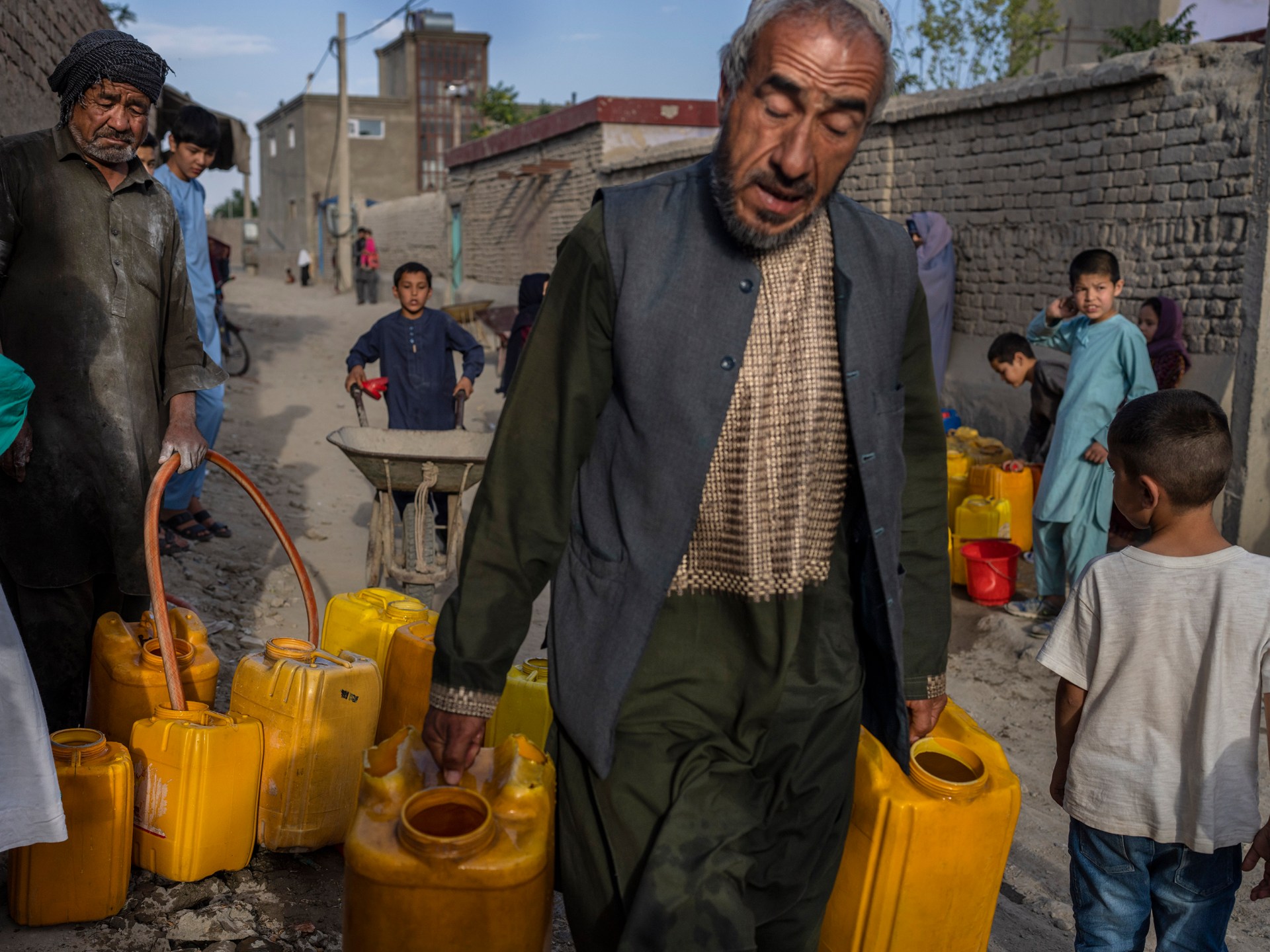Kabul, a city of over six million people, could become the first modern city to run out of water in the next five years, a new report has warned.
Groundwater levels in the Afghan capital have dropped drastically due to over-extraction and the effects of climate change, according to a report published by nonprofit Mercy Corps.
The next wars will be over water and food
Mmm, not sure, you might be underestimating our capacity for war. I think we can still do a few more over oil first. There will be wars over water and food though, no doubt about that.
First. Of many.
As bad a current geopolitical events are, unfortunately I don’t think we’ve seen anything yet.
I’m reminded of that Talib who was interviewed after the US pulled out; he missed the revolution and his new office job was sucking all the fun out of life. Who’d have thought those guys would make terrible administrators.
I remember reading that. It was pretty funny. Jihad is easy. Running a country is not. Who would have thought.
Not the MAGA cult, that’s for sure.
Several years ago I heads that Capetown South Africa would be the first major city without water…
Cape Town apparently decided to use desalination.
Permanent desalination is planned because seawater is available all the time, whether it rains or not, so it’s more reliable than any other water source. About 97% of water on Earth is in our oceans. We can make use of this huge resource through the process of desalination, which makes it drinkable and usable for us. Although desalination is the most expensive supply option and there are environmental issues that need to be well-managed (such as the salty ‘brine’ it produces as a waste product), it is an important part of the diversified water supply ‘mix’ going forward.
Says they start construction in 2026 and expect production starting in 2030.
Does desalination also get rid of microplastics and other chemicals like mercury?
Both distillation and reverse osmosis should get rid of microplastics. Reverse osmosis should get rid of mercury in any form, while it would depend on other chemical properties (evaporation rate, temperature source water is heated to, etc.) on whether distillation would remove chemicals like mercury.
They apparently have some temporary desalination stuff in place now to bridge the gap, dunno what it’s using.
The planned permanent plant apparently uses reverse osmosis (which, at least last time I looked, was much more widely used than distillation).
https://greencape.co.za/library/paarden-eiland-desalination-plant/
Jun 1, 2025 The planned permanent Paarden Eiland plant will be a 70 Ml/day seawater desalination plant with a multi-barrier process that will include pre-screening, dissolved air flotation, rapid gravity sand filtration, reverse osmosis, a potential advanced oxidation process, a disinfection step, stabilisation of the water, and safe brine disposal.
Thanks for the info. The link isnt loading for me, but I hope they are able to leverage renewables to power the desalination, as I’ve heard it is an energy-intensive process.
Yeah, isn’t loading at the moment here either.
hits archive.org
do Afghan authorities have the resources and expertise to address the issue?
yeah, no.
The Afghans are going to need some serious help and I don’t think the US can or will do it now. (We were failing before and now there’s no money for USAID and shit). Those people are proper fucked and population centers like Kabul are going to be concentrated misery. Please step up, Europe.
Please step up, Europe.
How is this Europe’s fault? The people of Afghanistan soundly rejected western assistance when they kicked us out and reinstalled the Taliban. Afghanistan has a government, the one its people supported and wanted. Let them take care of their own rather than turn to the “imperialists” they were so glad to be rid of.
Would you trust a government that constantly undermined your own sovereignty? Islamic extremism is a direct result to western meddling in the middle east. And “meddling” is putting it lightly
OK, then why is the first reflex to suggest that the west “step up”? Is this Schroedinger’s intervention, both desirable and not?
Its crazy to want this world where we all help each other right? Its dumbfuckery that we imagine its better to help people than to let them suffer, huh?
Can you expand on why they are suffering? What led to this current situation?
Climate change?
I’d suggest reading the article. Climate change certainly plays a part, but overextraction (in particular by their homegrown Nestlé equivalent) is a major driver of this. I fail to see how that is the west’s fault.
Uh… Yeah, bombing weddings day in and day out didn’t endear the West much to Afghans. How is that a surprise? Had Afghanistan not been invaded by America and co. in 2001, they’d have had 25 years od government experience to deal with this crisis, so Western imperialism is to blame for this.
Reading the article, it seems capitalism is the cause rather than imperialism past or present. Especially considering the Taliban were in charge in 2000 as they are today, could you explain how the situation would be meaningfully different without the (admittedly stupid) western military escapade? Would Talib like money less than they do today?
Reading the article, it seems capitalism is the cause rather than imperialism past or present.
Can you quote the part of the article that made you think so?Edit: Found it, but that’s presented in the article as a secondary cause. Because the main causes cited in the article are climate change, the impact of the war and sanctions, but that aside;As we’ve seen these past few years, the Taliban obviously have no idea how to run a country. They would’ve never lasted as long as they have in peacetime; it was the US invasion that sustained them all these years. Without that they’d have either grown into a competent-ish government in time to tackle the current crisis or been overthrown by a more competent faction. They also had real military opposition in the form of the North Afghanistan Alliance, which was coopted and ran into the ground by the West following the invasion, so now the Taliban are governing unopposed during a time of crisis that requires a competent and timely response. The US invasion stole 20 years from Afghanistan where they could’ve otherwise started to get their bearings as a modern state. And also, as the article states, Kabul’s population only got this big as a result of the war making the countryside less safe.
Clearly the soda company and the rich still have water, so I’d hardly say it’s a “secondary cause”, but anyway, even taking all you’ve said as true, that still doesn’t explain why the west should get involved here. What would we even do? Occupy the soda factory and give free bottles to everyone?
that still doesn’t explain why the west should get involved here.
For humanitarian reasons and because most of the origins of this crisis are Western-caused.
What would we even do?
for starters suspend sanctions, at least partially, so international aid, funding and expertise can enter the country. Then fund projects that could help avert the crisis.
“Several planned initiatives, including projects for artificial groundwater recharge, were suspended following the Taliban takeover,” Mayar pointed out. “Sanctions continue to restrict organisations and donors from funding and implementing essential water-related projects in Afghanistan,” he said.
Sadid pointed out one example: An Awater supply project -funded by the German Development bank KfW, along with European agencies – could have supplied 44 billion litres (11 billion gallons) of water annually to parts of Kabul from Logar aquifers.
“But currently this project has been suspended,” he said, even though two-thirds of the initiative was already completed when the government of former President Ashraf Ghani collapsed in 2021.
…
“Sanctions restrict Afghanistan’s access to essential resources, technology, and funding needed for water infrastructure development and maintenance,” he said. This, in turn, reduces agricultural productivity, and increases hunger and economic hardship, forcing communities to migrate, he warned.
In the first place the sanctions on Afghanistan are only going to be counterproductive. The people of Afghanistan need to develop economically before they can have political ambitions; the longer they’re kept in poverty the longer the Taliban will remain in power.
I’ve tried nothing and I’m all out of ideas!
Please never pursue politics or sociology as a career.
ok
deleted by creator
Honestly, the best country to approach this would be China, and I don’t think China would want to deal with the risk of building infrastructure.
China’s whole initiative is building infrastructure for other countries, the main problem is the trustworthiness of the Taliban.
Yeah, they have the means but probably not the will
No western country is likely to step up at this point, in my view at least. The conservative leaning folks are going hard into authoritarian xenophobic trends, and the left leaning folks consider anything that alters the existing culture of an area to be genocide.
The latter is really kinda tragically hilarious, cause we see countries like Canada declaring themselves genocidal and shaming their non-indigenous population as though they’re monsters, while simultaneously defending Israel’s actions in regards to Gaza. There’s even talk of making it a crime to question how horribly genocidal Canadians are, and also to make it a crime to say anything bad about Israel. If we see a religion-backed school, we’re to think “genocide! You’re attempting to subvert the student’s cultural religion and norms under the guise of teaching people to read and write! Their traditional culture doesn’t have reading or writing, you’re genociding their oral traditions too!!”; and when we see a mass grave filled with civilians, we’re to think “Totally justified, those bulldozers are just defending themselves against the toddler / journalist / civilian corpses, and mass graves are just practical! No moral issues or crimes here! Definitely not a genocide”. These things were brought forward by our left-leaning government parties. Not sure if those’ve passed yet, but they’ve definitely been on the table.
Ha, yes there’s some truth to that. Moral relativism has twisted the left in knots and many then struggle to reconcile viewpoints that are completely incompatible.
If we see a religion-backed school, we’re to think “genocide! You’re attempting to subvert the student’s cultural religion and norms under the guise of teaching people to read and write! Their traditional culture doesn’t have reading or writing, you’re genociding their oral traditions too!!”;
If you’re talking about residential schools, I think the mass graves part was more genocidal than the reading and writing part.
If you believe there were mass graves in a similar vein as you see in Israel, Nazi Germany, or other similar genocides, you haven’t looked into it all that much. There was no mass execution of First Nations. They had a higher rate of death among children as a demographic over a roughly 150 year period during the operation of the Residential schools. There were children that died while at residential schools – some who were buried in unmarked graves and/or buried in places their next of kin didn’t know. Even the headlines that get posted generally highlights that they’re “unmarked” graves, not “mass” graves in recognition of this fact. This was mostly during the earlier parts of that time line, where things like “phones” were less common (so you couldn’t call their parents), the older generation couldn’t read/write (so a letter to notify parents may’ve been sent but would be less effective), and moving a corpse across the country to a small remote community was incredibly expensive. The times journalists try to sensationalize it and claim it as a ‘mass grave’, they’re generally referring to an area with multiple unmarked graves, where the children were laid to rest by the church (individually) – basically a big graveyard without headstones, that formed over the 100+ year period, as the church buried kids incrementally one by one over that period.
But the Church was never rounding up and executing children by the hundreds in a planned approach to snuff out the lives of an entire people. The root of the ‘genocide’ is/was that the Church and Canada was (arguably) intentionally and systematically using the residential school system to convert FN into more western ways of thinking and cultures (“killing” the culture, not the people – sorta more like how Russia abducted a bunch of Ukrainian kids, and is systematically indoctrinating them into Russia). That, coupled with an aggregate statistic over a century, is what’s used to call Canada genocidal and lump the country in with what’s going on in Israel currently.









